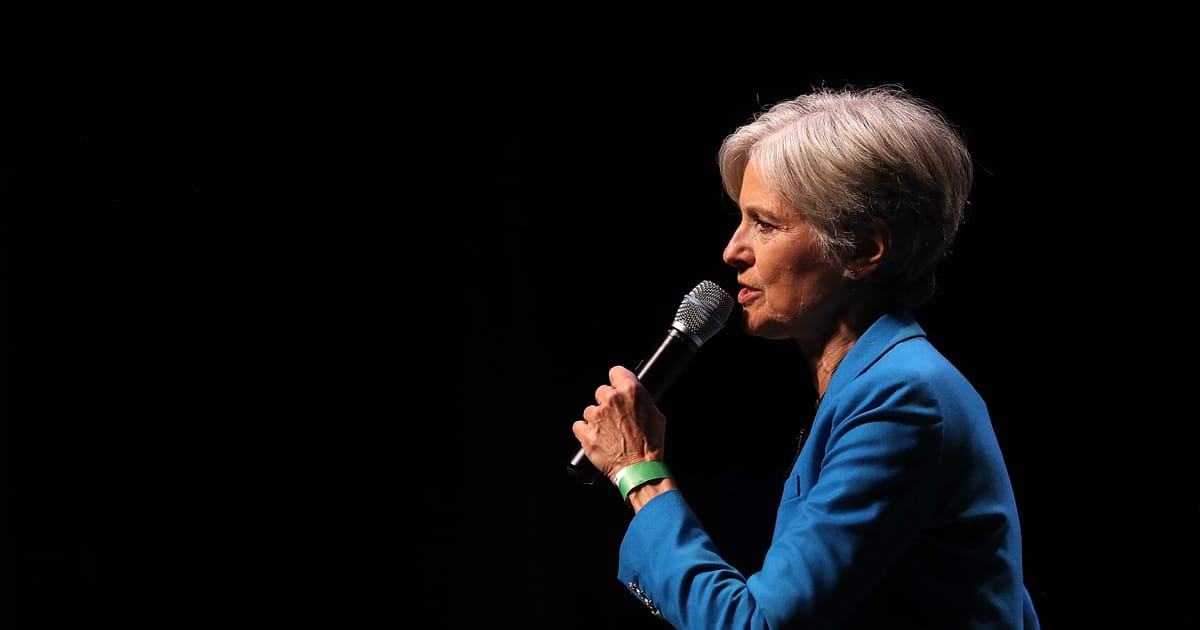Green politicians from across Europe on Friday called on U.S. Green Party presidential candidate Jill Stein to withdraw from the race for the White House and endorse Democrat Kamala Harris instead.
“We are clear that Kamala Harris is the only candidate who can block Donald Trump and his anti-democratic, authoritarian policies from the White House,” Green parties from countries including Germany, France, Denmark, Italy, the Netherlands, Ireland, Estonia, Belgium, Spain, Poland and Ukraine said in a statement, which was shared with POLITICO ahead of publication



Parliamentary systems basically do the same thing as presidential systems, just in a different way.
There are only two really viable parties, and other parties can only really influence things via the spoiler effect in the US.
Yes. However, there are also very few actually viable party coalitions in most parliamentary systems. Like, the far-left party probably isn’t going to enter into coalition with the far-right party. And neither has anywhere near enough support to actually determine the executive. Any coalition they enter into is going to mandate a lot of compromises from what their particular party program – what we in the US typically call a “party platform” is. So…they aren’t really an option for running the executive, even if they show up on the ballot.
In a parliamentary system, the parties make their promises to the public. Then the vote happens. Then there’s some horse-trading, and parties throw out some – not known to the public at the time of election – of their electoral promises, and create a coalition.
It’s true that in the US system, you basically only have two viable parties…but that’s because in the US, parties are more analogous to party coalitions in some parliamentary systems. Basically, in the US, the horse-trading happens before the election, so you see the coalition that you can vote on at the time of the election. The parties in a parliamentary system with many parties are maybe more analogous to the caucuses. So, we don’t have a “party for black people” in the US…but we do have the Congressional Black Caucus, which (mostly) operates inside the big-tent Democratic party.
The fact that parties expect to likely have to throw out some promises in a parliamentary system also comes with some issues. The UK uses FPTP rather than proportional representation, so tends away from having coalitions, but is a parliamentary system, and can do so. It is very likely, from what I’ve read, that the reason that the UK Brexited was because of some jiggery-pokery associated with this. Basically, the Conservative Party in the UK had promised its voters a referendum on UK membership in the EU. However, at the time this promise was made, the Conservative leadership expected not to be able to achieve a majority, that they would have to form a coalition with the Liberal Democratic party, as they had previously. The Liberal Democratic party was strongly in favor of being in the EU, and probably would have required them to not hold such a referendum as a condition of being in coalition. Holding a referendum is not actually something that the Conservative Party likely wanted to actually do. As a result, the Conservatives could make such a promise and get the electoral support from doing so…with the expectation that they would never have to actually follow through on it, because they’d get the opportunity to throw out some of their electoral promises to voters during the coalition-forming process. However, they did better than expected, and didn’t form a coalition, and were stuck holding a Brexit referendum. You won’t get that in the US, since the executive makes their promises prior to the election.
NGOs, like the EFF or Greenpeace or the like, also tend to play a larger role in the process in the US, which provides for a lot of options as to involvement in advocacy. In Europe, some countries developed “Pirate Parties”, political organizations that work something akin to the EFF here (though there’s also the EDRi in Europe, it acts as more of a coordinating institution).
One other issue that parliamentary systems run into is that after the election, they have to decide on a coalition to choose the new executive. This usually doesn’t take too long, but sometimes the legislators don’t agree in the post-election horse-trading process, and the result is that no executive gets chosen (or, in some cases, as in Italy, a “technocratic” executive gets chosen for the public). Belgium and Northern Ireland have recently had extended periods without an executive (which, in their terminology, is “without a government”), which hampers their ability to do much. In a presidential system, after the election, you know who is going to be running the executive.
In the US, the Big Two parties also hold primary elections, which permits you, as a member of the public (usually registered as a voter of that party, though there are even some exceptions to that), to choose which candidates you want your party to run. That isn’t a constitutional requirement, and some parties do not do that. However, it’s also input that frequently isn’t available to the electorate in Europe, where legislative candidates are selected internally by the party.